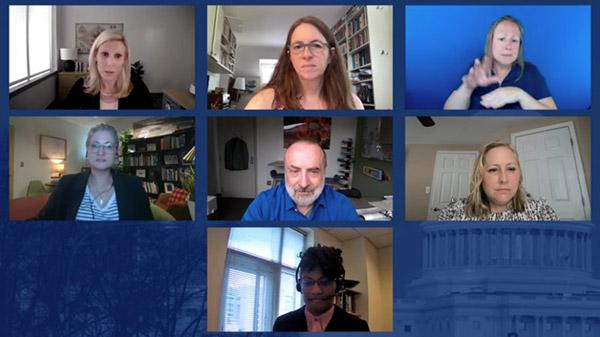Emily Gaines Buechler
/ Released on July 25, 2023
More than 61 million people with disabilities live in the United States, yet inequities persist. On July 20, in celebration of Disability Pride Month, experts from Johns Hopkins University came together to discuss how research can inform policy through the lens of “disability justice,” broadly defined as the process of addressing inequities that affect people with disabilities. The virtual event, open to the public as part of the Johns Hopkins Congressional Briefings series, included panel discussions and real-time Q&A with scholars from a range of disciplines.
Bonnie Swenor, director of the Johns Hopkins Center for Disability Health Research and associate professor in the School of Nursing, moderated the event. “While great strides have been made toward making society more inclusive for people with disabilities, there is often a disconnect between the disability community, researchers, and policymakers,” Swenor said in her opening remarks, kicking off the multidisciplinary discussion.
Video courtesy of Johns Hopkins University
Highlights:
mental health
“Mental disorders have less legislation and policy in place than physical disorders,” said Judy Bass, a professor in the Department of Mental Health at the Johns Hopkins Bloomberg School of Public Health. But Bass emphasized that mental disorders “are really chronic conditions that require lifelong management.” Therefore, more policies are needed to reduce disparities, increase access, and reduce stigma and other barriers.
education
The right to an education is a fundamental right for every individual, but it is often not fully accessible to students with disabilities. A major reason for this is ableism, which is “subtle and easy to miss,” said Linda Carling, director of the Center for Educational Technology in the School of Education. “Eliminating ableism requires a major shift in mindset to recognize, challenge, and dismantle the attitudes and beliefs that perpetuate discrimination against people with disabilities,” Carling explained.
health care
Doctors and medical researchers “need to understand how things interact with each other.” [and] “People shouldn’t be reduced simply to specific biological markers,” said Jack Iwashina, professor of medicine and Bloomberg Distinguished Professor of Social Science and Medical Justice. For example, millions of people are currently suffering from long-term COVID-19 infection, and “research needs to take into account the reality of their ongoing infection.” [symptoms]”Even after the best possible care is provided,” Iwashina said.
the study
Research shows that people with disabilities are often excluded from research studies and clinical trials. [and funding are] “To advance the inclusion of people with disabilities in clinical trials and research, we should not be allowed to exclude them without scientific justification,” said Jennifer Diehl, an associate professor at the Bloomberg School of Public Health. Moreover, intersectionality — an individual’s multiple identities — needs to become “a core demographic that is collected and reported in research,” Diehl said.
caregiver
An often overlooked segment of the disability population includes people with disabilities who serve as unpaid caregivers for family members with disabilities. This demographic must navigate a complex health care system for themselves as well as their families, but they often struggle financially and are looking for paid work that matches their caregiving (and self-care) responsibilities, said Janice Taylor, an assistant professor in the School of Nursing. “We are starting to learn about this population from the ground up, and they need funding, support, and policies to improve their health outcomes and fill unmet needs,” Taylor explained.
Watch the full conversation in the briefing’s archived video at this link and visit the Johns Hopkins Center for Disability and Health Research website to learn more about the Center’s mission.

